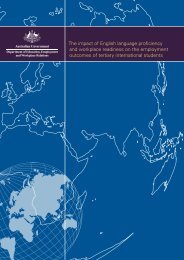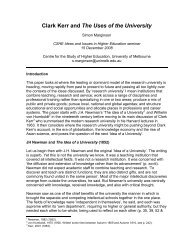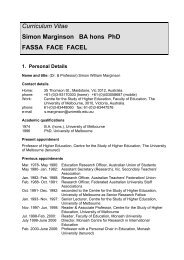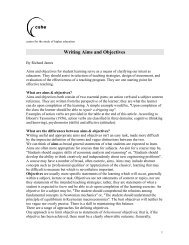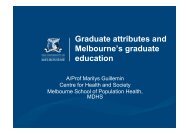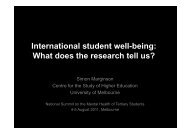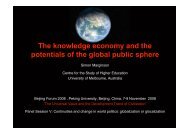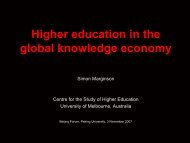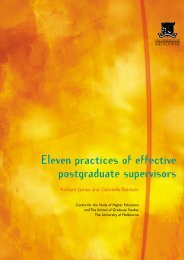The preparation of Mathematics Teachers in Australia - ACDS
The preparation of Mathematics Teachers in Australia - ACDS
The preparation of Mathematics Teachers in Australia - ACDS
You also want an ePaper? Increase the reach of your titles
YUMPU automatically turns print PDFs into web optimized ePapers that Google loves.
Executive Summary<br />
This report exam<strong>in</strong>es the characteristics <strong>of</strong> mathematics teach<strong>in</strong>g <strong>in</strong> <strong>Australia</strong>n secondary<br />
schools – the demographics and qualifications <strong>of</strong> the teachers <strong>in</strong>volved, their teach<strong>in</strong>g<br />
responsibilities, and the issues for schools with regard to teacher supply and quality. <strong>The</strong><br />
objective is to determ<strong>in</strong>e the current status <strong>of</strong> mathematics teach<strong>in</strong>g <strong>in</strong> order to <strong>in</strong>form the<br />
decision-mak<strong>in</strong>g processes <strong>of</strong> governments, universities and education authorities with<br />
regard to mathematics education and teacher tra<strong>in</strong><strong>in</strong>g.<br />
<strong>The</strong> project’s f<strong>in</strong>d<strong>in</strong>gs draw upon a nationwide survey <strong>of</strong> mathematics teachers and heads<br />
<strong>of</strong> mathematics departments <strong>in</strong> secondary schools conducted <strong>in</strong> late 2005. All<br />
ma<strong>in</strong>stream secondary schools were <strong>in</strong>cluded <strong>in</strong> the survey, with the permission <strong>of</strong> the<br />
relevant education authorities. Responses were received from 2924 teachers <strong>of</strong><br />
mathematics and 612 heads <strong>of</strong> mathematics, represent<strong>in</strong>g 30 per cent <strong>of</strong> the nation’s<br />
secondary schools. <strong>The</strong> result<strong>in</strong>g dataset is representative <strong>in</strong> terms <strong>of</strong> state/territory,<br />
school sector and country/metropolitan regions.<br />
<strong>The</strong> results <strong>of</strong> this study highlight the urgent need to prepare more people for<br />
mathematics teach<strong>in</strong>g <strong>in</strong> schools. Three <strong>in</strong> four schools currently experience difficulty<br />
recruit<strong>in</strong>g suitably qualified teachers for mathematics classes, and the impend<strong>in</strong>g<br />
retirement <strong>of</strong> the ‘baby-boomers’ is set to exacerbate this situation. In addition, many<br />
younger teachers are unsure <strong>of</strong> their career plans and so may also be lost from the<br />
system <strong>in</strong> the next few years.<br />
Preparation for mathematics teach<strong>in</strong>g needs to be highly discipl<strong>in</strong>e-specific. <strong>Mathematics</strong><br />
teachers typically cover a broad range <strong>of</strong> mathematics subjects, with limited <strong>in</strong>volvement<br />
<strong>in</strong> teach<strong>in</strong>g non-mathematics subjects. <strong>The</strong>y therefore require a strong tertiary ground<strong>in</strong>g<br />
<strong>in</strong> mathematics knowledge, skills, and teach<strong>in</strong>g methods specific to mathematics.<br />
<strong>Teachers</strong> tell us this themselves – those with the highest levels <strong>of</strong> atta<strong>in</strong>ment <strong>in</strong> tertiary<br />
mathematics are the most satisfied with their qualifications.<br />
<strong>Mathematics</strong>, unlike science, is a subject studied by virtually all students throughout their<br />
school years. Schools therefore need to staff a large number <strong>of</strong> mathematics classes. As<br />
teachers teach<strong>in</strong>g ‘out-<strong>of</strong>-field’ are not well equipped to teach mathematics, the challenge<br />
for schools lies <strong>in</strong> recruit<strong>in</strong>g and reta<strong>in</strong><strong>in</strong>g suitably qualified and motivated mathematics<br />
teachers. <strong>The</strong> challenge for universities, governments and education authorities is to<br />
ensure the supply <strong>of</strong> such teachers – teachers with the strong, mathematics-specific<br />
ground<strong>in</strong>g necessary to teach mathematics well.<br />
Tertiary qualifications <strong>of</strong> mathematics teachers<br />
• N<strong>in</strong>ety per cent <strong>of</strong> teachers held a teach<strong>in</strong>g-related qualification, rang<strong>in</strong>g from<br />
teach<strong>in</strong>g certificates to diplomas and bachelor degrees <strong>in</strong> education. <strong>The</strong> most<br />
common qualification comb<strong>in</strong>ation was a bachelor degree <strong>in</strong> science with a<br />
Diploma <strong>of</strong> Education.<br />
• <strong>Teachers</strong> with science-based degrees had, on average, studied more discipl<strong>in</strong>ebased<br />
mathematics than teachers hold<strong>in</strong>g a bachelor degree <strong>in</strong> education.<br />
• Seventy-five per cent <strong>of</strong> teachers <strong>of</strong> senior school mathematics held a<br />
mathematics major.<br />
• <strong>Mathematics</strong> teachers with the highest levels <strong>of</strong> mathematics-related tertiary<br />
study were the most satisfied with their tertiary <strong>preparation</strong>. Forty per cent <strong>of</strong><br />
teachers were not satisfied with their tertiary background as <strong>preparation</strong> for their<br />
current teach<strong>in</strong>g roles.<br />
• Eight per cent <strong>of</strong> mathematics teachers had studied no mathematics at university.<br />
One <strong>in</strong> five teachers had not studied mathematics beyond first year, <strong>in</strong>clud<strong>in</strong>g 23<br />
per cent <strong>of</strong> junior school teachers.<br />
• Many teachers had studied no mathematics teach<strong>in</strong>g methods, <strong>in</strong>clud<strong>in</strong>g one<br />
third <strong>of</strong> those who taught only junior/middle school.<br />
• <strong>Teachers</strong> under 30 years <strong>of</strong> age were significantly less likely than their older<br />
colleagues to hold a mathematics major or to have studied mathematics teach<strong>in</strong>g<br />
methods.<br />
vi



